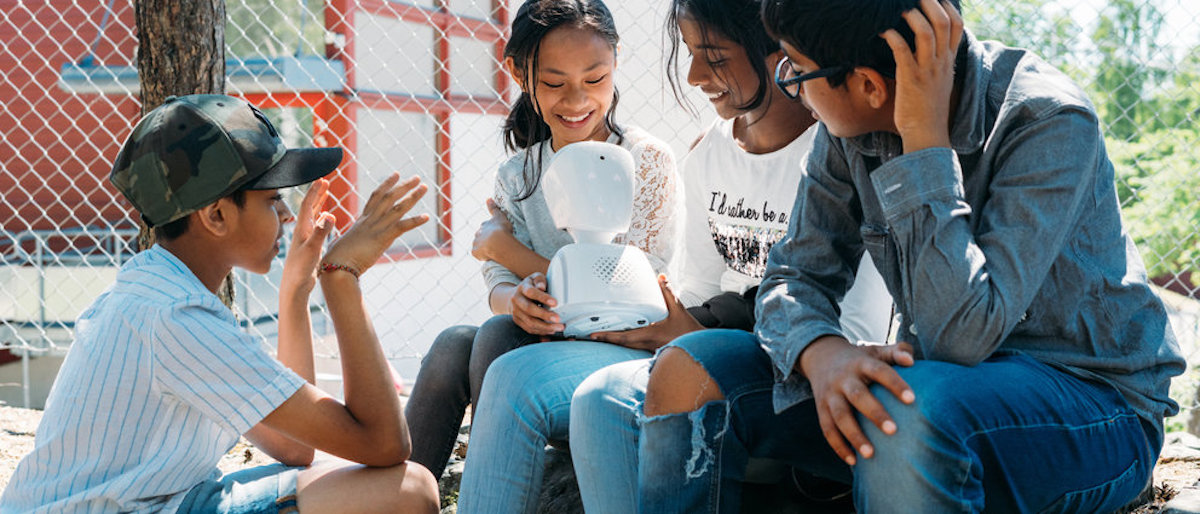 Insight
Insight


Hospital and Outreach Education were recently granted with £522,142 to provide continued education to children absent from school due to long-term illness. The grant is a part of The Alternative Provision Innovation Fund, set up by the UK’s Department for Education to deepen the evidence base on how to improve outcomes for children in alternative provision.
The project, in partnership with No Isolation and 10 alternative provision schools across the country, aims to support the education of children suffering from long-term physical and mental illness through the introduction of AV1 robots, which would enable the children to virtually attend school, socialise with classmates and remain connected to their home schools and communities. In addition to improving the overall levels of education, the collaboration also aims to minimise the impact that school absence can have on a child’s friendships, mental wellbeing and future prospects. Using AV1 will ensure that the child remains an active part of their school community, even if they are being treated outside of their home county, easing the transition of the pupil back into full-time education wherever possible.
The project will provide 90 children in key stages 1-5, with No Isolation’s AV1 telepresence robot, in order to allow them to continue ‘attending’ school throughout their treatment. The children, affected by a variety of conditions ranging from Chronic Fatigue Syndrome (ME) and cancer, to mental health illnesses, including anxiety and eating disorders
Those participating in the project will use AV1 to virtually attend school for as long as they are unwell, with assessments and evaluations taking place throughout this time. If, after recovery, the student no longer requires an AV1, the telepresence robot will be reallocated, which would potentially increase the reach of the project from the initial 90 children to as many as 360.
Cath Kitchen, the project lead, has been involved with alternative provision for over 18 years, serving as the chair of the National Association for Hospital and Home Teaching for over ten years. During this time, the evaluations conducted by Hospital and Outreach Education consistently showed that pupils ranked lowest when asked how well they stayed in touch with their school and friends.
“Having been involved with alternative provision for nearly two decades, I know firsthand the impact that absence from school can have on a child’s education and mental wellbeing.”
– Cath Kitchen, Project Lead
‘Having been involved with alternative provision for nearly two decades, I know firsthand the impact that absence from school can have on a child’s education and mental wellbeing. I hope that the findings from this project will pave the way to providing equal access to education for students with medical and mental health difficulties, enabling them to fulfil their potential. I hope that every child, already suffering from the impact of a long-term condition, will not have to suffer further by feeling lonely and socially isolated from their school and their friends. I feel that No Isolation’s AV1s, supported by the fund and the partner organisations, and backed by evidence based research, will illustrate how technology can be used positively to support this vulnerable group of learners and enhance their educational experiences during their period of illness.’
Once the project is complete, the findings should provide a sound evidence base to support the use of telepresence solutions in education, as well as providing data for evidencing improved outcomes through the use of AV1s. The project is being externally evaluated by Ecorys with the explicit goal of disseminating best practice within the wider education sector.
The added benefit of using AV1 is that the local authority is not funding one-to-one individual tuition, but making the most of the student’s own school’s expertise, which is not only more beneficial for the student, but also more cost-effective. For reference, a day of education through an AV1 costs less than £10.
Speaking on No Isolation’s involvement with the project, Karen Dolva, CEO and Co-Founder of No Isolation, comments: ‘Our overarching goal is to end involuntary isolation, making sure that no one, irrelevant of age, gender, ability or socio-economic status, ever feels alone. To be part of this project is incredibly important to us – seeing our first product used in a government scheme in order to improve education and provide chances to children and young adults, cannot be expressed in words. We have no doubt that the two-year project will prove to be a success. The perfect result for us would be to raise awareness of the benefits that warm technology can bring, with more schools using AV1 and with every child who needs one, having access to one without delay. Our end goal is to end all isolation and reducing isolation while improving the education of young people is the perfect place to start’.
Co-written with Nora Scheel, Researcher and Grant Administrator, No Isolation
Originally posted here